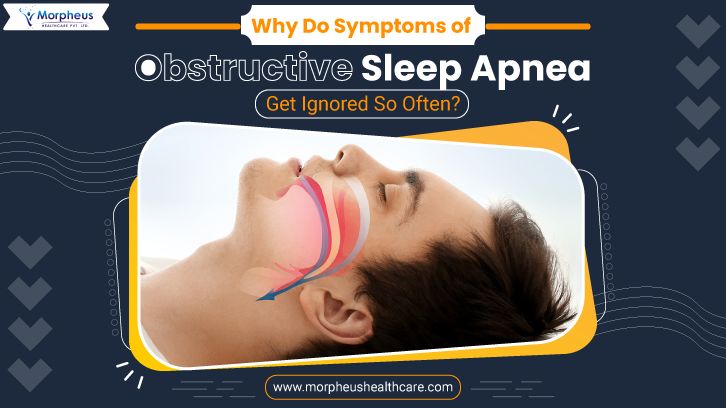Why Do Symptoms of Obstructive Sleep Apnea Get Ignored So Often?
Feb 17, 22

First, let’s break down what Obstructive Sleep Apnea means. Apnea means cessation of breathing, so simply put Obstructive Sleep Apnea is a sleep disorder wherein the upper airway breathing passage gets obstructed during sleep. This leads to stoppages in breathing while we are asleep.
OSA is predominantly found in people above the age of 30-35 and is strongly characterized by symptoms of loud snoring & daytime sleepiness.
What Causes Obstructive Sleep Apnea?
There may be a genetic predisposition for the condition. Some people are simply born with narrower air passages compared to other individuals.
Secondly, one of the functions of sleep is to provide rest and relaxation to our muscles. This relaxation of muscles surrounding the upper airway may cause the airway to become narrow or even collapse. One of the first signs that our body gives us of the collapsing of upper airways is snoring. Snoring is caused by the fluttering or vibration of the soft narrow airway passage during our breathing in sleep.
Other factors contributing towards Sleep Apnea include obesity or weight gain, and lifestyle factors such as consumption of sedatives, alcohol or nicotine.
What are the Symptoms of Obstructive Sleep Apnea?
The symptoms of OSA can be classified as those experienced by the person themselves and ones observed by their bed partner.
The common symptoms of Sleep Apnea experienced the person themselves are
-
Poor Quality Sleep: Waking up feeling unrefreshed or wanting to sleep more than the average adult are signs of poor quality sleep experienced in OSA.
-
Dry Mouth: Due to excessive oral breathing to compensate for narrow air passage, one experiences a sensation of dry mouth or parched throat.
-
Excessive Daytime Sleepiness: Feeling drowsy at work, being lethargic throughout the day or simply falling asleep when not engaged in a stimulating activity is a common symptom of Sleep Apnea.
- Poor Concentration, Mood & Memory: Its is common to show irritable behavior, being forgetful about day to day tasks, or finding it difficult to focus in any activity for long periods of time.
It’s easy to ignore these symptoms!!
Sleep Apnea, like most other disorders, increases in severity gradually over time. All the above symptoms may not occur from the onset of the disease for everybody. The severity of symptoms keeps on increasing slowly, hence making It difficult for the individual to understand the behaviour change they experience. Often people attribute daytime sleepiness or poor concentration to either old age or high daily stresses. Further, one may misinterpret their ease of falling asleep anytime and anywhere to be normal. People even mistake this ability to fall asleep quickly as a sign of good sleep.
How can the spouse or bed partner help in identifying OSA symptoms?
There are key symptoms of OSA which are observed by a spouse or bed partner, and can help detect an early onset of the condition. These include –
- Loud Snoring – A chronic and loud snoring, especially while sleeping on your back is the most common symptom of sleep apnea.
- Observed or Witnessed Apneas – If your bed partner notices short intervals of 10-15 seconds during which the snoring completely stop and visible chest movement is also not seen, then this can be a cause of worry. It demands immediate attention as it is an indication of apnea or cessation of breath.
Sleep Apnea is an extremely dangerous disorder, as it leads to drop in oxygen levels in our body during sleep. OSA has also been linked to other disorders such as type-2 diabetes, hypertension and cardiovascular events.
However, it is also possible to manage and treat this condition with timely diagnosis and medical support. If you or someone in your family experiences any of the mentioned symptoms, then you should seek medical assistance.


